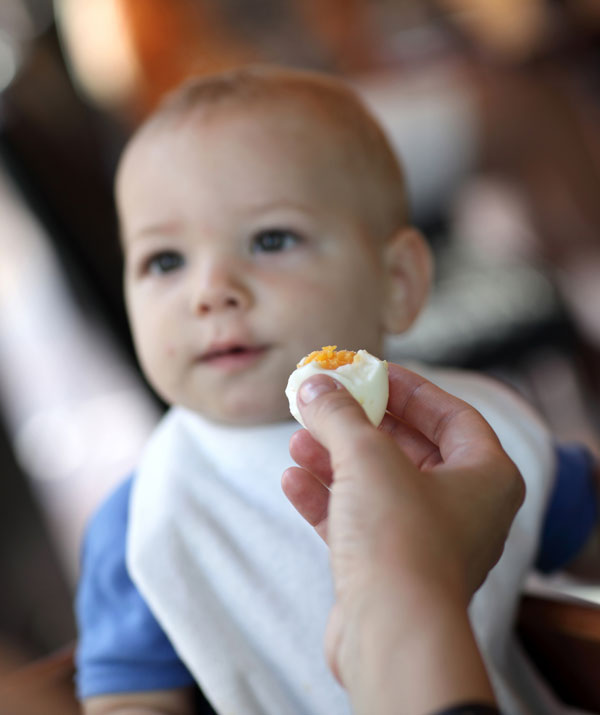Parents can often be concerned about giving egg to their babies, as they commonly cause food allergies. However, it is best to offer your baby well cooked egg before 12 months of age. Delayed introduction of these foods has been shown to increase the chance of developing a food allergy.
At around six months, puree or mash one hard-boiled or scrambled egg and serve it to your baby. For a more liquid consistency, add breast milk or water. From the eight month mark, scrambled egg pieces make a fantastic finger food for your little one. When offering new foods it’s a good idea to do it during the day instead of the evening, so you can keep an eye on bub and respond if they have an allergic reaction.
Food containing raw or minimally cooked eggs can contain Salmonella which is why it’s advised to wait until your child is 12 months or older before serving runny eggs.
When starting solids, make the introduction of different foods gradual, both in terms of quantity and the speed of feeding. Ensure it consists of very basic, natural foods, such as fruit and vegetables, that can be managed by their still-sensitive digestive system.
Remember that encouraging your little one to accept a wide variety of healthy foods early on in her life will have plenty of benefits later, when he begins to express his personal eating preferences.

Babies from six months can eat eggs, as long as they are thoroughly cooked. *Image: Getty Images.
Eggscellent eggs
Whole eggs are so nutritious that they are often referred to as “nature’s multivitamin”. A single egg contains essential minerals like copper, zinc, selenium, calcium and iron. It also has proteins, cholesterol, fat, fatty acids, and vitamins D, B12, E, choline and folate. All of the above nutrients are essential for the healthy growth and development of infants.
Storing eggs
• Eggs and egg products should be stored in the fridge to minimise the growth of harmful Salmonella bacteria.
• Store eggs in their original carton in the fridge and do not use eggs that are out of date.
• When transporting foods that contain raw egg, pack in an insulated cooler with enough ice, frozen blocks or a frozen juice box to keep them cold.
• Don’t put the insulated cooler in the car boot- carry it inside an air-conditioned vehicle.
Continues after video
What you need to know about food allergies
If you have a family history of allergies, you will need to be more cautious with the introduction of new foods. Always talk to your GP first, if you have any concerns.
Mild allergic reactions to food may cause rashes, slight wheezing or a runny nose. Severe allergies are rare, but become apparent soon after he has eaten, with vomiting or diarrhoea, hives (reddened, itching skin), or swelling around her mouth.
If your baby displays any of these symptoms, seek urgent medical help. If his face is swelling up, he seems faint or has trouble breathing, call an ambulance.
These foods are considered unsuitable for infants according to the Australian Government Eat for Health Infant Feeding Guidelines:
• Don’t give babies soft drinks, fruit juice, fruit drink, coffee, all teas, soy, rice or other cereal drinks.
• Babies should not be fed honey or raw eggs.
• Avoid hard foods like nuts and raw carrots that could lead to choking.
• Cook baby foods yourself from fresh ingredients whenever you can, but don’t add sugars or salt. Using frozen or canned foods is okay too, as long as they don’t have added sugars or salt.
• Commerical baby foods are fine from time to time but babies need to try a wide range of tastes and textures.



